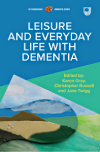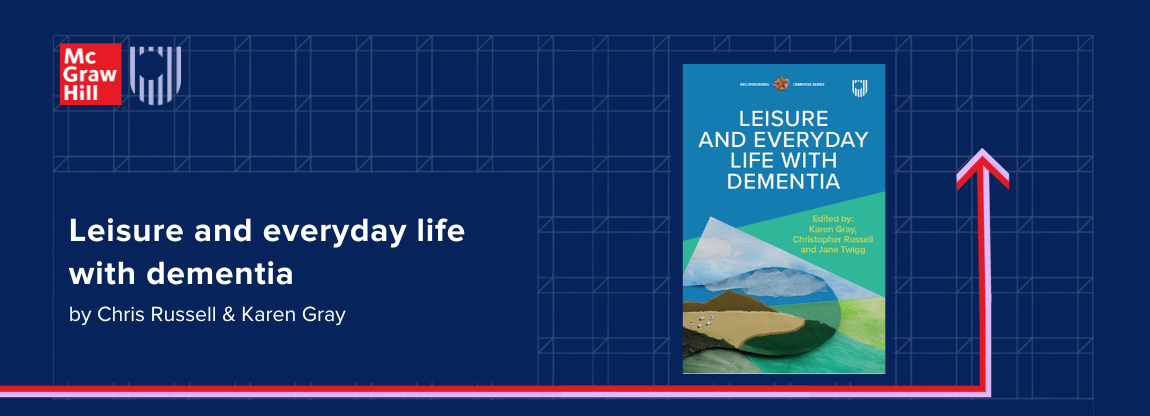Leisure and everyday life with dementia
The vision propelling ‘Leisure and everyday life with dementia’ came from the firm belief that a diagnosis of dementia does not mean life is over. Far from it, the book aligns with the thinking and advocacy of many people affected by dementia and scholars around the world who argue that everyday life can and must continue after diagnosis. As a result, this edited collection fits well with the series of books of which it is part – ‘Reconsidering Dementia Series’. Their mission is to promote different thinking about dementia, and to place people affected by the syndrome at the heart of ongoing and everyday life.


The concept of leisure
Leisure is universally prized and valued. The opportunity to engage in pastimes that one chooses and enjoys is more than a whim, it should be a right, part of essential humanity. The book, therefore, takes this as a founding principle. It goes on to explore the theory underpinning leisure. For example, the ideas of ‘casual’ and ‘serious’ leisure, which illustrate how people engage in leisure in different ways and for different reasons, as an informal hobby, or maybe as something requiring more dedication and finely honed skills. It incorporates ‘communicative’ leisure - activities and interests that maximise opportunity for social interaction and the creation of meaning for individuals. Such understanding provided core elements underpinning the book. They help to show how people living with dementia might choose to engage with different kinds of leisure, and the value that could be gained from interests which accentuate contact with others.
An overview of the book
Another foundational concept was that of ‘social citizenship’. In the dementia context this is the idea that everyone within society must prioritise and maximise opportunities for people to sustain the role within everyday life that aligns with their wishes and aspirations. It aligns, therefore, with what was described earlier about how enjoying and taking part in the leisure activities we choose being a right.
Contributing authors took these foundational elements and applied them to different leisure contexts. So, for example, music in daily life is explored in a chapter concluding that music is a valuable leisure activity for many people living with dementia, and that their ongoing use of music as leisure may be shaped by their personal history, experiences, culture and identity. In another chapter, communication in social leisure activities is a focus. Here insight is offered about how quizzes can be organised so that they are inclusive of people, including those who are living with dementia that is more advanced. The final chapters investigate how places matter in relation to leisure and everyday life with dementia. The diversity of settings within which leisure can take place are showcased in accounts of participation within national sporting stadiums, woodlands and natural environments, museums and art galleries, and the virtual world of information technology.
How the book came together
From the outset people living with dementia influenced the design and content of the book. Indeed, one of the three co-editors has lived experience of dementia. Her vision helped shape the entire collection, encouraging every author to consider leisure as offering potential to be sociable, and inclusive, purposeful - if this was the participant's wish – as well as life affirming and fun.
Authors, all experts in their field, were gathered from North America and Europe. They included several whose expertise derived from lived experience of dementia and engagement in leisure. A careful editorial process of comment and revision kept the foundational principles and vision for the book strong and sustained throughout its development and into publication.
Our hopes for how it might be useful
Each chapter concludes with a section outlining learning for practice. It was important for us that this learning could be applied by readers to enhance and encourage the inclusion of leisure as a part of everyday life with dementia. Thus, each chapter offers insights for those supporting or enabling the involvement in leisure of people living with dementia (including researchers), for people living with dementia themselves, and for their family friends and care partners.
However, this is not a book about leisure therapy - a ‘how to’ guide. Rather it advocates for and explores ways in which leisure can be offered to people living with dementia as something that is part of ongoing life. It details the inherent advantages for wellbeing this can bring, and discusses the challenges. At heart it is a call to arms for likeminded people to do all they can to realise the vision behind the book: to make leisure available to people living with dementia as a right, in a way that is sociable, inclusive, purposeful - if this is the participant's wish - and life-affirming and fun.
Dr Karen Gray is a researcher at the University of Bristol, UK. She has wide-ranging experience in researching and evaluating engagement in arts and creative activity for health and wellbeing.
Dr Chris Russell is Senior Lecturer with the Association for Dementia Studies at the University of Worcester, UK, where he is Programme Lead for the Post Graduate Certificate in Dementia Studies.
Jane Twigg has a background as a physiotherapist. This was before caring for her mom, who had dementia, including supporting Mom to continue to live in the world. Jane is now living with atypical dementia. She has a passion for life. Long distance walking brings her most joy, giving her a sense of achievement and wellbeing.


Leisure and Everyday Life with Dementia

